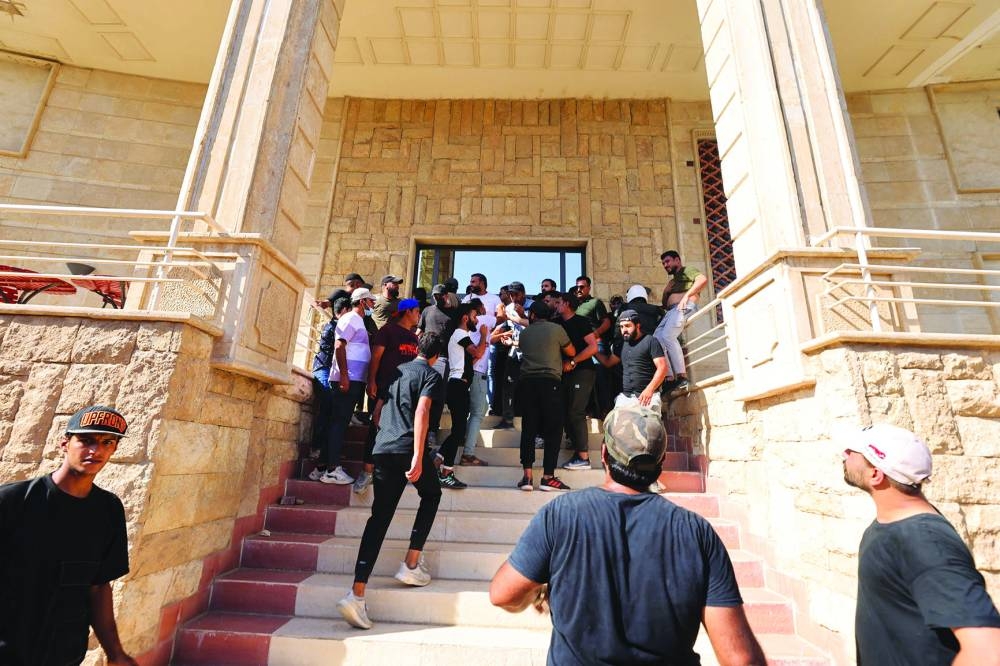Protesters breached Sweden’s embassy in Baghdad on Thursday, angered by a Qur’an burning outside a Stockholm mosque that sparked widespread condemnation across the Muslim world.
A crowd stayed inside the compound for about 15 minutes, then left as security forces deployed, an AFP photographer said.
“Our constitution is the Qur’an,” read a message on leaflets carried by the protesters, and a message sprayed on the compound’s gate said “Yes, yes to the Qur’an”.
The protest came a day after an Iraqi citizen living in Sweden, Salwan Momika, 37, desecrated the holy book and set several pages alight in front of the capital’s largest mosque.
Swedish police had granted him a permit in line with the so-called “free-speech.”
The police authorities said that while it “may have foreign policy consequences”, the security risks and consequences linked to a Qur’an burning were not of such a nature that the application should be rejected.
After the burning, Swedish police charged the man who carried it out with agitation against an ethnic or national group.
The Qur’an burning, coinciding with the start of the Eid al-Adha and the end of the annual pilgrimage to Makkah in Saudi Arabia, sparked anger across and beyond the Middle East.
Iraq’s foreign ministry condemned Sweden’s decision to grant an “extremist” permission to burn the Qur’an and said such acts “inflame the feelings of Muslims around the world and represent a dangerous provocation”.
Cleric Moqtada Sadr had called for the demonstration at the Swedish embassy to demand the removal of the ambassador.
Protester Hussein Ali Zeidan, 32, told AFP that he came out to “support the noble Qur’an” and called to revoke Momika’s citizenship as “he does not represent Iraq”.
Saudi Arabia, which hosted around 1.8mn Haj pilgrims, denounced the Qur’an burning, with the foreign ministry calling it part of “hateful and repeated attacks” on Islam.
The 57-member Organisation of Islamic Co-operation (OIC) said it would hold an “emergency meeting” to discuss the situation.
An OIC Official said the talks would most probably be held on Sunday in Jeddah.
Iran joined in the condemnation, with Foreign Minister Hossein Amir-Abdollahian saying the Qur’an burning was an “insult” against “religious sanctities”.
“Calling these behaviours freedom and democracy only encourage terrorism and extremism,” he warned in a tweet.
Turkish President Recep Tayyip Erdogan also denounced Sweden for allowing a protest, further clouding the Nordic nation’s chances of quickly joining the North Atlantic Treaty Organisation (Nato).
“We will eventually teach the arrogant Westerners that insulting Muslims is not freedom of thought,” Erdogan said in televised remarks. “We will show our reaction in the strongest possible terms, until a determined victory against terrorist organisations and Islamophobia is achieved.”
Egypt called the Qur’an burning a “disgraceful act provoking the feelings of Muslims” as they mark the Eid, while the Cairo-based Arab League branded it an “assault on the core of our Islamic faith”.
The United Arab Emirates foreign ministry said it had summoned the Swedish ambassador and “stressed that Sweden disregarded its international responsibilities and demonstrated a lack of respect for social values”.
Kuwait said perpetrators of “hostile acts” must be brought to justice and “prevented from using the principle of freedoms as a ploy to justify hostility against Islam or any holy faith”.
“This new offensive and irresponsible act disregards the feelings of more than a billion Muslims,” the emirate said.
Bahrain said that “insulting religions is inconsistent with religious freedom ... and generates hatred, extremism and violence”.
Libya’s foreign ministry said such action “contradicts international efforts aimed at bolstering tolerance and moderation, and rejecting all forms of extremism”.
In neighbouring Tunisia, the foreign ministry denounced an “odious crime” while Morocco summoned Sweden’s charge d’affaires in Rabat and recalled its ambassador over “these repeated provocations, committed under the complacent gaze of the Swedish government”.
The Palestinian foreign ministry denounced a “flagrant attack on human rights, values of tolerance, acceptance of others, democracy and peaceful coexistence”.
Syria slammed the “disgraceful act” while the Iran-backed Hezbollah movement in neighbouring Lebanon said Swedish authorities were “complicit in the crime”.
Further afield, Pakistan’s foreign ministry said it “strongly condemns the despicable act” while Prime Minister Shehbaz Sharif said he was “disgusted and appalled” by the Qur’an burning in front of a mosque.
“I have no words to adequately condemn this anti-Islam act, which is clearly meant to hurt the feelings of Muslims around the world,” Sharif said.
Afghanistan’s Taliban government also reacted angrily, labelling the Qur’an burning an act of “utter contempt towards this noble religion”.

Protesters are seen inside the courtyard of the Swedish embassy in Baghdad after they breached the building briefly.
